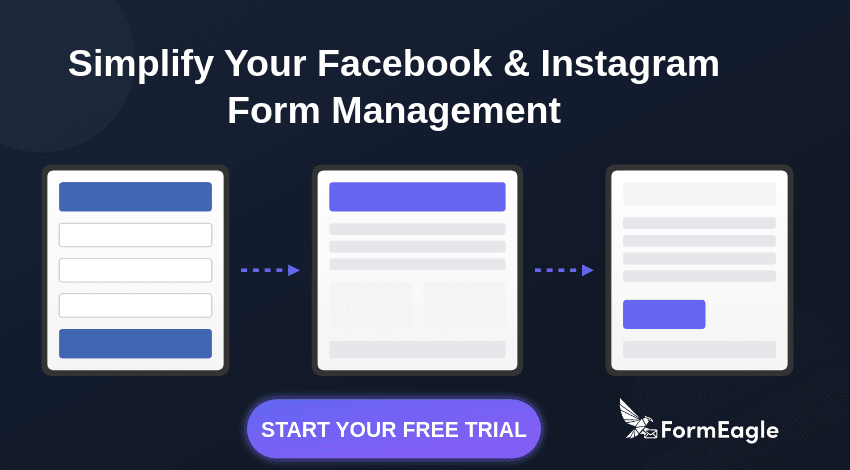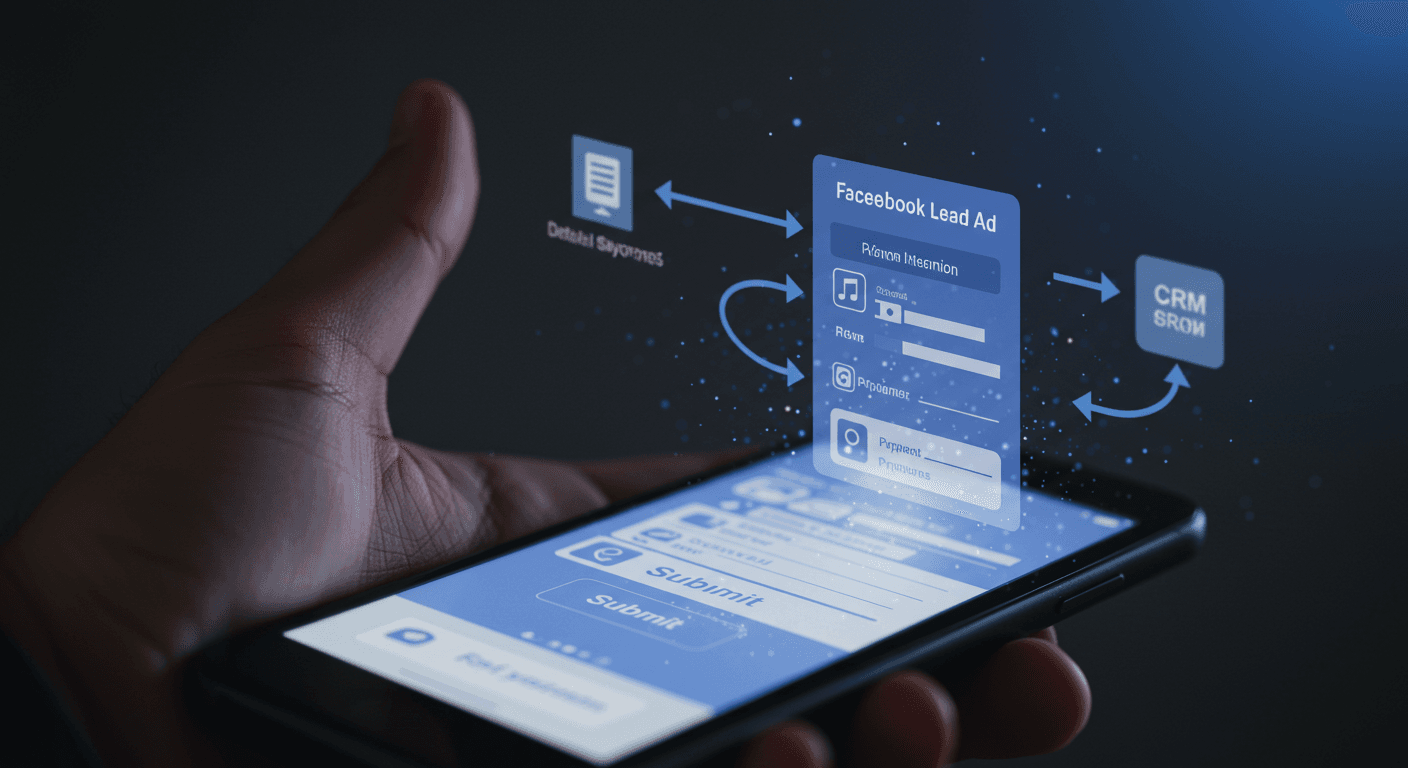Facebook lead automation involves using tools to automatically manage and process leads generated through Facebook ads, such as transferring data to CRMs, sending follow-up emails, and qualifying leads. This helps businesses handle large volumes of leads efficiently without manual intervention, which is especially useful given Facebook's vast user base of over 3.07 billion monthly active users as of 2025 (Facebook Users Statistics).
Why It Matters
Automating Facebook leads is important for efficiency, as it reduces errors and saves time. It also supports scalability, allowing businesses to manage more leads as they grow, and enables personalized communication, which can boost conversion rates. Additionally, it’s cost-effective, freeing up resources for other areas, with studies showing a potential 50% reduction in cost per lead compared to traditional methods (Facebook Lead Gen Stats).
Tools and Implementation
Popular tools include FormEagle, which simplifies Meta , Google and Tiktok Ads integration, and Zapier, known for connecting to over 5,000 apps. To implement, set up Facebook lead ads, choose a tool, configure workflows, and test for optimization. Best practices include segmenting leads and ensuring GDPR compliance.

Understanding Facebook Lead Automation
Facebook lead automation refers to the use of technologies and tools to streamline the management, processing, and follow-up of leads generated through Facebook's lead generation ads. These ads allow businesses to capture user information directly on the platform, such as names, email addresses, and phone numbers, without users leaving Facebook. The automation process can include:
-
Automatically transferring lead data to a Customer Relationship Management (CRM) system or other business tools.
-
Sending personalized welcome emails or messages to new leads to nurture them.
-
Qualifying leads based on predefined criteria, such as budget or interest level, and routing them to the appropriate sales team members.
-
Tracking interactions with leads and updating their status in real-time for better follow-up.
This automation ensures that no lead is overlooked, and each is handled efficiently, which is particularly beneficial for businesses dealing with high volumes of leads. The concept is rooted in the broader field of marketing automation, which has seen significant growth, with a 2024 report from Marketing Automation Statistics indicating that 91% of the most successful companies use automation for lead management.
Importance of Automation in Lead Generation
The importance of Facebook lead automation cannot be overstated, especially in today’s competitive digital landscape. Here are the key reasons why it matters:
-
Efficiency: Manual lead management is prone to errors and can be time-consuming. Automation ensures leads are processed quickly and accurately, reducing the risk of losing potential customers due to delays.
-
Scalability: As businesses grow, the number of leads can increase exponentially. Automation allows companies to handle larger volumes without needing to proportionally increase staff, making it a scalable solution.
-
Personalization: Automated systems can be configured to deliver personalized experiences, such as tailored email sequences based on user behavior or demographics. This personalization can significantly improve engagement and conversion rates, with a 2024 study from Email Marketing Trends showing personalized emails have 29% higher open rates.
-
Data Accuracy: Human error in data entry, such as typos or missed entries, is minimized with automation, ensuring lead information is accurate and up-to-date for better decision-making.
-
Cost-Effectiveness: By reducing the need for manual labor in lead management, businesses can save on operational costs and allocate resources to other critical areas, such as ad spend or product development. For example, Belle Strategies Consulting notes that Facebook Lead Gen Ads can achieve at least a 50% reduction in cost per lead compared to sending traffic to landing pages.
These benefits align with the growing trend of digital transformation, where businesses leverage technology to enhance customer interactions and operational efficiency. With over 3.07 billion monthly active users, Facebook provides a vast audience for lead generation, making it an essential platform for businesses.

Tools for Facebook Lead Automation
Several tools are available to facilitate Facebook lead automation, each with unique features.
Zapier: Known for its extensive app integrations, Zapier allows businesses to connect Facebook lead forms to CRMs like Salesforce, email marketing tools like Mailchimp, and more. It’s ideal for small to medium businesses looking for flexibility.
Integromat: Offers more advanced automation capabilities, such as multi-step workflows and custom scripts, making it suitable for businesses with complex needs or technical teams.
FormEagle: A specialized platform designed for automating lead capture from Meta Ads (formerly Facebook Ads), TikTok, and web forms. It handles API complexities, eliminating the need for businesses to manage permissions or updates, and integrates seamlessly with CRMs and ERPs. FormEagle also offers powerful AI Reports, as shown in the attached visuals, providing actionable insights into campaign performance, user behavior, and platform optimization. These AI-driven reports, including detailed analytics on lead distribution, ad set performance, temporal patterns, and user preferences, empower businesses to refine strategies, boost ROI, and make data-driven decisions effortlessly.
Expert Insights
Social media is about the people! Not about your business. Provide for the people and the people will provide for you.
Best Practices for Effective Automation
To maximize the benefits of Facebook lead automation, businesses should follow these best practices:
Define Clear Objectives: Understand what you aim to achieve, whether it’s increasing lead volume, improving conversion rates, or enhancing customer engagement. Clear goals guide the automation setup and evaluation.
Segment Your Leads: Use data from Facebook, such as demographics or behavior, to segment leads into groups (e.g., high-value vs. low-value leads). This allows for targeted follow-up, improving effectiveness.
Personalize Communications: Leverage automation to send personalized messages, such as emails addressing leads by name or offering content relevant to their interests. This builds trust and increases engagement.
Monitor and Analyze Performance: Regularly review key metrics, such as lead conversion rates, response times, and customer satisfaction scores, to identify areas for improvement. Use analytics tools integrated with your automation platform for insights.
Stay Compliant: Ensure your lead automation processes comply with data privacy regulations, such as the General Data Protection Regulation (GDPR) in Europe or the California Consumer Privacy Act (CCPA) in the U.S. This includes obtaining consent for data collection and providing options for users to opt-out.
These practices ensure that automation not only saves time but also enhances the quality of lead interactions, aligning with ethical and legal standards.

In conclusion, Facebook lead automation is a transformative strategy for businesses aiming to efficiently manage and convert leads from social media. By automating processes like data transfer, follow-up, and qualification, companies can save time, improve accuracy, and focus on building meaningful relationships with potential customers. The tools discussed, particularly FormEagle, offer robust solutions to streamline these efforts.
If you’re ready to elevate your lead management, consider exploring FormEagle. Visit their website at FormEagle to see how they can help you automate and optimize your lead generation process, driving better results for your business.
